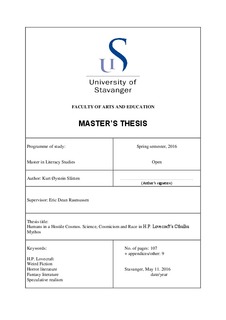| dc.contributor.author | Slåtten, Kurt Øystein | |
| dc.date.accessioned | 2016-08-22T12:53:07Z | |
| dc.date.available | 2016-08-22T12:53:07Z | |
| dc.date.issued | 2016-05 | |
| dc.identifier.uri | http://hdl.handle.net/11250/2400445 | |
| dc.description | Master's thesis in Literacy studies | nb_NO |
| dc.description.abstract | This thesis is a study of the “Cthulhu Mythos”, which is a fictional universe created and developed by American Weird Fiction writer H. P. Lovecraft. The study focuses primarily on Lovecraft’s philosophical idea of “cosmicism”, which is the notion that the human species is small, transient and insignificant in relation to the cosmos. Many critics and scholars recognise that cosmicism is an important factor in the Cthulhu Mythos. As this study demonstrates and discusses, the otherwise pessimistic and non-anthropocentric implications of cosmicism can be renegotiated through interpretations of how certain elements and themes in the Mythos stories, such as religion, culture and aesthetics, are presented and framed.
Before treating the implications of cosmicism, I discuss representations of modern science and scientific rationales in the stories. Lovecraft attained the idea of cosmicism through scientific studies and his interpretations of contemporary scientific theories. In the Cthulhu Mythos, the representation of cosmicism is bound up with representations of modern science, which is a central element in the fiction. The scientific procedures and investigations in the stories tend to bring about frightening and disillusioning implications of how humans are threatened by malevolent cosmic entities, rather than the empirical and enlightening understanding about cosmos and reality that was sought in the first place. As different cosmic elements are brought into the stories, Lovecraft employs a suggestive and “de-literalising” language to convey the protagonists’ limited understanding of these, and the confusion and fear that eventually develops into existential horror as they realise humanity’s fragile and threatened position in the cosmos.
Lovecraft’s controversial xenophobic and racist views are reflected in some of his fiction. The extent to which these views are reflected in the Cthulhu Mythos is not clear, however. Some argue that it is reflected there more subtly and allegorically, and that racism is significant as an underlying motivation to the Mythos stories. I assess the possibility of reading some of Lovecraft’s Cthulhu Mythos fiction as an allegory on immigration and miscegenation at the end of the thesis. There I argue that although it is possible to read the Cthulhu Mythos as reflecting race views figuratively and allegorically, this unnecessary in order to attain a useful understanding of the fiction and its literary context. This understanding is better achieved through reading the Cthulhu Mythos as a fictionalised representation and possible renegotiation of cosmicism and its implications. | nb_NO |
| dc.language.iso | eng | nb_NO |
| dc.publisher | University of Stavanger, Norway | nb_NO |
| dc.relation.ispartofseries | Masteroppgave/UIS-HF-IKS/2016; | |
| dc.rights | Navngivelse 3.0 Norge | * |
| dc.rights.uri | http://creativecommons.org/licenses/by/3.0/no/ | * |
| dc.subject | lesevitenskap | nb_NO |
| dc.subject | literacy studies | nb_NO |
| dc.subject | weird fiction | nb_NO |
| dc.subject | horror literature | nb_NO |
| dc.subject | fantasy literature | nb_NO |
| dc.subject | speculative realism | nb_NO |
| dc.subject | H. P. Lovecraft | nb_NO |
| dc.subject | fantastisk litteratur | nb_NO |
| dc.title | Humans in a Hostile Cosmos : Science, Cosmicism and Race in H.P. Lovecraft’s Cthulhu Mythos | nb_NO |
| dc.type | Master thesis | nb_NO |
| dc.subject.nsi | VDP::Humanities: 000::Literary disciplines: 040::English literature: 043 | nb_NO |

